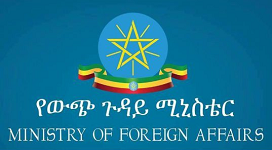By Sisay Woubeshet – The Government of Ethiopia has repatriated over 400,000 Ethiopians from Saudi Arabia in the last three years, the Ministry of Foreign Affairs of Ethiopia said.
The Ethiopian immigrants in Saudi are returned back home from May 2017 to March 2020, according to the press statement of the Ministry. “Ethiopia has never refused to receive its citizens from any country but operates according to principle and the availability of resources and capacity. Unfortunately, Ethiopia is the source, transit, and destination of migrants. And we have migrants in problem in Africa and the Middle East countries at a higher scale,” it said.
Sector coordination is a must when doing repatriation. The sectors involved are the Ministry of Foreign Affairs of Ethiopia, including Ethiopian Embassies with the host government, the Ministry of Health, the Ministry of Peace, the Ministry of Labor and Social Affairs, the Ministry of Transport, Job Creation Commission and the corresponding bureaus in the regions. The process goes as identification, data sharing, background check and citizenship confirmation, repatriation, reintegration (psychosocial support, subsistence, and transportation to destination).
We have been successful in Beirut working with many stakeholders and we are working with the UN in Yemen and with the Kingdom of Saudi Arabia. With an increasing number of migrants crossing the border into Saudi Arabia, the Ethiopian government is closely working with the Kingdom in many areas and assisting migrants being one of the priorities. Since the number of migrants is enormous, following their cases has become a full-time engagement for many of the diplomats in our Embassy in Riyadh and the consulate office in Jeddah.
From April to July 2020, 3500 citizens were repatriated. Illegal migrants crossing the border of Saudi Arabia from Yemen experience a greater frustration because of a long traumatic journey through heinous condition caused by traffickers. They are held in a detention center waiting to be returned and discovering that the promises of traffickers and brokers are absolute lies. The number is escalating and the Kingdom of Saudi Arabia is accepting them despite their increasing number. The Government of Ethiopia is always thankful for that.
Our mission in Saudi has assigned dedicated employees to be stationed and consistently visit the migrants at detention centers. The Ethiopian mission staff lends a hand when different problems arise and works with the Saudi authorities to resolve them. Reports are sent on incidents and periodic reports are evaluated by the missions. We all have to understand the enormity and complexity of the process of illegal migration and repatriation. Repatriation cannot be a goal by itself. It should be done in a safe and dignified manner up to the reintegration point.
The Government of Ethiopia would like to extend its sincere appreciation to the Kingdom of Saudi Arabia for the outstanding support extended to our citizens in general and Ethiopian irregular migrants in particular.The Kingdom has always been willing to collaboratively work with us at this difficult time and assisting our increasing number of migrants crossing the border despite the international pressure.
Horrific stories are the center of trafficked migrants; these are things that we need to take into account in the process of detention, repatriation, and integration. This calls for a collaborative effort between countries, among international organizations, and the media. The Ethiopian government needs to exert higher effort in fighting human traffickers and brokers, making border controls more effective, and creating awareness for the youth. We are not doing enough.
Our government and the Kingdom of Saudi Arabia have noticed a vicious circle of many repatriated migrants trafficked back for 10 times and more. The processes of establishing a consultative body with the Kingdom of Saudi Arabia is imperative to take the task of controlling and monitoring the cyclic out-migration of irregular migrants and to protect migrant rights. Tangible cooperative ventures at the bilateral level are critical for dealing with migration issues and both countries are committed to make this a reality.
When COVID-19 hit in April 2020, with the unknown nature of the pandemic the repatriation process was impacted. Despite this difficulty, 3500 were returned, quarantined, and transported to their destination area. In the meantime, the Ethiopian government was working with Saudi officials who raised concerns about the increasing number of migrants crossing the Saudi border.
The Kingdom of Saudi Arabia has always been collaborative in establishing a safe and dignified repatriation process. Accordingly, our mission prioritized about 2000 citizens and sent us their details. The Ministry of Peace, the Ministry of Health, the Ministry of Labor and Social Affairs have finalized the review and we will be repatriating these migrants beginning September 8 through October 6. In the meantime, our missions in the Kingdom will continue to prioritize and work on the details of the detainees.
Ethiopia has increased the border checkpoints in establishing five more and planning to reach at least 27 of them. The Ministry of Foreign Affairs would like to take this opportunity to thank the Ethiopian community in the Kingdom of Saudi Arabia for all their support. With a generous offer by the Kingdom of Saudi Arabia, the Ministry of Foreign Affairs and the Ministry of Labor and Social Affairs have prepared a proposal helping to support projects in source regions to integrate returnees.
“Given the excellent relationship we hold, we have continued discussions showing our commitment to bring a lasting impact on the reintegration of returnees and to work hand in hand with stakeholders in the fight against human trafficking,” the Ministry said in its statement.

